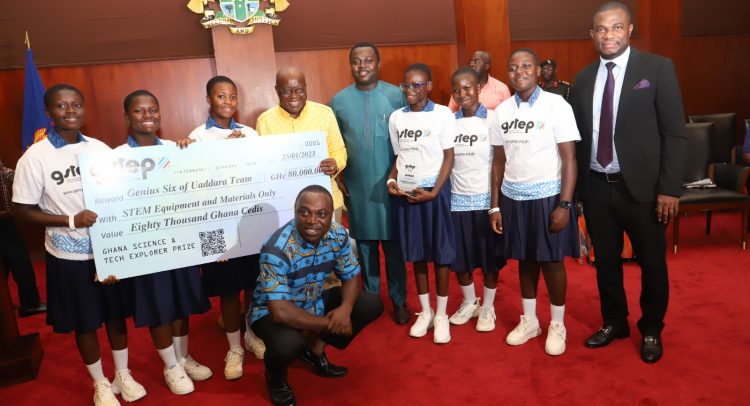President Akufo-Addo with the winners
President Akufo-Addo has stressed the need for Ghana to consider producing more engineers for the country’s development.
He believes engineers hold the key to the industrialisation agenda the country so much desire in its development as was done by China.
China, according to him, has been able to transform its economy, particularly in the 21st century because of its strategic plan to train engineers who have gone on to grow the economy of the communist country to become the 2nd biggest in the world.
This was when he received the six winners of the maiden edition of the Ghana Science and Tech Explorer Challenge Prize (GSTEP), their school authorities, and event partners at the Jubilee House Wednesday 19 April 2023.
“The journey of the 21st century is about science and technology. The most extraordinary success story so far on the 21st century in the economy of China. 40% of students at the tertiary level in China are engineering students and these are the statistics that we have to try and achieve if indeed our dream of transformation is going to be more than a dream”, he said.
He therefore noted “[We have to target] 40% of tertiary students in Ghana has to be engineering students because clearly, engineers hold the key to the process of development and transformation.”
The six students of the Udara Basic School who won the maiden Ghana Science and Tech Explorer Challenge Prize (GSTEP) included Persis Oppong Agyeman, Priscilla Osei Tutu, Priscilla Appiah, Haizel Comfort Boampomah, Akua Acheampongmaa Appau, and Princess Helena franchise Agyeman demonstrated to the President the Illuminated Child Road (ICR) safety device they invented to win the prize.
“We developed this idea due to the close proximity of our school to the Komfo Anokye Accident and Emergency Unit in Kumasi. Because of that, our student were being knock-down by vehicles as they attempted to cross the road due to the speed which drivers ply the road”, Priscilla OseI-Tutu who is one of the winners explained.
She cited a 2020 report from the Road Safety Commission which indicated that more than 60% of road fatalities that occurred involved school children, saying “Considering all these unfortunate events, we saw that indeed, there was the need to make such a device and fortunately for us, that device won the maiden edition of the GSTEP challenge.”
President Akufo-Addo was wowed by the exceptional skill exhibited by the students and congratulated them for their achievement and success.
“A lot of people come here but I don’t think I have seen any of them do what I have seen this afternoon. I am astonished and delighted about what has taken place this afternoon an I want to congratulate you for what you have been able to do” President Akufo-Addo said in praise.
He urged them to continue in their chosen path of endevour because potentially, they will in the near future become responsible for important technologies that will transform the livelihoods of Ghanaians.
He took the opportunity to thank those who put the whole project together, saying “we have to find a way of getting not only the Ministry of Education but also the Ministry of Roads and Transport to look seriously about the possibility of adopting the apparatus that you have invented to be used across the country.”
The GSTEP
The Ghana Science and Tech Explorer Challenge Prize (GSTEP) Challenge excites, encourages and supports Junior High School (JHS) students (ages 11-16) and teachers in Ghana to develop practical Science, Technology, Engineering & Maths (STEM) skills and products that benefit local communities.
During this 3-year programme, GSTEP will be working with 20,000 Junior High School (JHS) students – as well as teachers, schools, and communities in the Greater Accra, Eastern, and Ashanti regions – to encourage practical learning and the development of STEM and ICT skills through a series of challenge prizes.
As part of these prizes, GSTEP will challenge students to come up with innovative new ideas to solve problems in their communities and, ultimately, support them to cultivate them into enterprising products and solutions.
By Charles Takyi-Boadu, Presidential Correspondent

